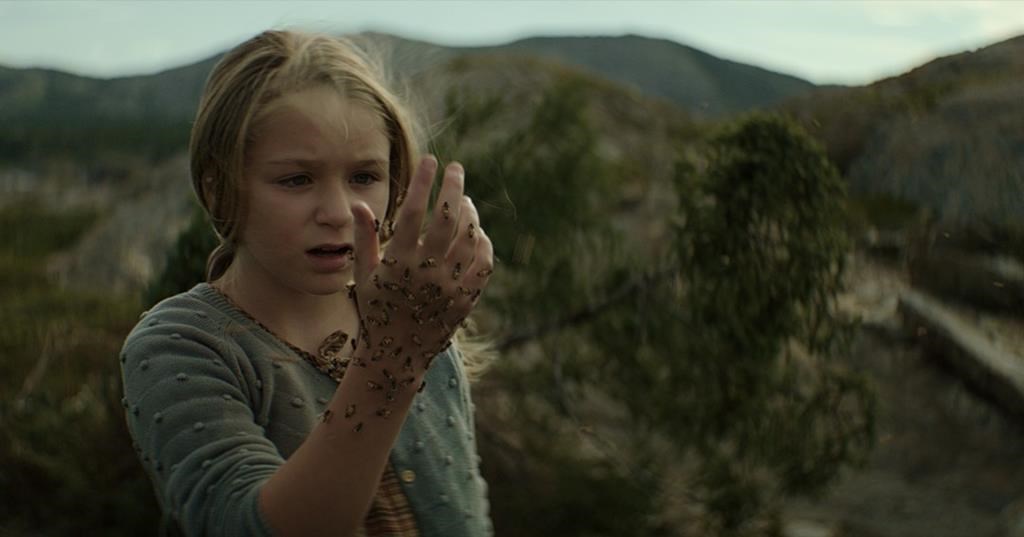Reviews
“True Detective: Night Country” Review – Issa López’s Gripping, Genre-Bending Season Sets a High Bar

Showrunner/Writer/Director Issa López makes a drastic departure from the previous three seasons of the noir crime series “True Detective” by relocating the setting to Northern Alaska at the start of Polar Night, launching “True Detective: Night Country” with a scene that hails straight out of horror. This inciting event set at an arctic research station, complete with knowing winks to The Thing, sets the atmospheric tone for a compelling, intense season that easily sets a high bar for the series.
Investigating the mysterious and sudden disappearance of the research station’s inhabitants, with no trace left behind save for a woman’s tongue found beneath a desk, is gruff Ennis police chief Liz Danvers (Jodie Foster). It’s the precise type of event that a small town like Ennis isn’t accustomed to handling, making the already acerbic Danvers all the pricklier and more frustrated. That’s never more apparent than with the arrival of State Trooper Evangeline Navarro (Kali Reis) on the scene. An unspoken history exists between the pair, lacing every interaction with venom and tension, but Navarro has a personal stake in solving the disappearances that seem tied to an unsolved cold case.
As evidence mounts and conspiracies unfurl, Danvers and Navarro make an uneasy alliance to solve the case even as forces conspire against them.

The fourth season of the series runs two episodes shorter than its predecessors, making for a much more tightly wound story without sacrificing complexity. López packs a lot in to present a fully realized town full of dark secrets and uneasy history that informs its characters and overarching mystery. It’s not the mystery that serves as the throughline, however, but the complicated relationship between Danvers and Navarro. Danvers isn’t an easy person to like. She’s intellectually superior to her Deputy, Hank Prior (John Hawkes), and she makes it known at every step. The police chief has a way of alienating almost everyone she encounters with her abrasive, standoffish personality, save for Prior’s son and fellow Officer Peter (Finn Bennett), a competent up-and-comer that Danvers coaches. Navarro is the warmer of the two, but only slightly. Driven by the need to bring justice to her cold case victim, Navarro is prone to violence and brash behavior that leaves her almost as socially irredeemable as her reluctant partner.
In lesser hands, Danvers and Navarro would polarize audiences and make it tricky to find a foothold into the season’s central investigation. Jodie Foster’s capable hands ensure that we may not always agree with Danvers, but she’s engaging, complex, and human enough to retain audience investment. Kali Reis wears Navarro’s insecurities and vulnerabilities on her sleeves, earning easy sympathies even when the character is prone to self-destruction. Both actors are helped by Issa López’s writing and subversion of archetypical roles, which creates an air of mystery behind the two leads that further draws us in and carries the season even when the investigation takes a backseat to focus on Ennis’ residents. While the season may belong to Foster and Reis, there’s not a weak link among the stellar ensemble of supporting players.

There’s a fascinating structure to “Night Country.” López wastes not a second of those six episodes yet makes the proceedings feel like a slice of life in an underexplored pocket of the world and all the quirks that come with it. More importantly, the showrunner once again demonstrates keen instincts in playing with genres. “Night Country” is atmospheric and intense, toggling between supernatural chills and noirish dread with an ease that not only sets this season apart but further reels you into this unique, singular world. López offers wry winks and knowing nods to influential horror while injecting her own brand of horror without overstepping the established world of “True Detective.” Bursts of gore or emotional intensity get punctuated, on occasion, with enough levity to prevent the season from becoming too heavy or grim. Longtime fans will find plenty of connections to the original series, though occasionally a bit heavy-handed in execution.
All of it builds to one riveting, satisfying finale that helps solidify “Night Country” as an easy series highlight. López takes the series’ foundation and builds something wholly new from it through actualized characters, gripping drama, political unrest, grisly secrets, and fearlessness to veer straight into horror when needed. The exceptionally crafted season, like its icy setting, offers a breath of fresh air.
“True Detective: Night Country” premieres January 14 on HBO and Max at 9:00pm ET, with remaining episodes airing weekly on Sundays.


Reviews
‘The King Tide’: An Island Town Rots with Moral Decay in Canadian Folk Horror Fable [Review]

The opening scenes of director Christian Sparkes’ The King Tide set an ominous tone: a powerful storm takes down the power lines of a small island town as a pregnant woman loses her child while her dementia-suffering mother sits nearby. In the morning, as the town takes stock of the damage and the power is restored, a surprising discovery is found in an overturned boat in the harbour: a baby girl…with the ability to heal.
Writers Albert Shin and William Woods, working from a story by Kevin Coughlin and Ryan Grassby, treat the story as something of a morality tale mixed with a fable. Following the cold open, the action jumps ahead 10 years at a point when the unnamed island (the film was shot in Newfoundland, Canada) is thriving. The fishing is bountiful, the islanders are self-sufficient and have cut ties with the mainland, and most everyone is happy.
As characters are prone to saying, it’s all thanks to Isla (Alix West Lefler), the miracle baby who has grown up worshipped by the islanders. While Mayor Bobby Bentham (Clayne Crawford) and his wife Grace (Lara Jean Chorostecki) endeavor to raise Isla like any other little girl, the reality is that the island’s entire ecosystem revolves around her miraculous powers. It is only because of Isla that they survive; every aspect of their lives – from medicine to food – relies on her.
Each day the citizens line up for their allotted time with the young girl – be it to stave off breast cancer, like Charlotte (Kathryn Greenwood), or recover from another night of heavy drinking like former doctor, Beau (Aden Young). There’s even a predetermined schedule for when she will go out on the boats and use her power to lure fish into the nets.

One fateful day, Bobby succumbs to peer pressure and alters Isla’s schedule at the last minute to accompany cod fishermen Marlon (Michael Greyeyes) and Dillon (Ryan McDonald). A childish game with fatal consequences is played, but with Isla indisposed, a young boy, who would have otherwise been fine, dies. And while the rest of the community grieves, it is Isla who is completely shaken and, unexpectedly, loses her powers.
Suddenly the entire balance of the island is thrown off. Folks like Grace’s mother, Faye (Frances Fisher), who relied on Isla to keep her dementia at bay, suddenly reckon with mortality, while the food security of the town is called into question. Faye’s late-night “support group” meetings take on an urgent and secretive tone and the townspeople claim ownership of Isla’s time despite Bobby and Beau’s protests that she needs rest to recover from her trauma.
Like the best thrillers, the politics and personalities within the community come into play as morals are compromised and the good of individuals vs the collective is played out in increasingly desperate situations. The King Tide excels because it is interested in exploring the competing motivations of the townspeople, while also resolutely refusing to paint anyone as inherently good or bad. These are desperate people, determined to remain independent and free from outside interference, while protecting their trapped-in-amber way of life.

These developments work because there’s a humanity to the characters and The King Tide wisely relies heavily on its deep bench castoff character actors to drive the conflict. Crawford is the de facto protagonist of the ensemble and he’s also the most straightforward character: Bobby is a good man and a loving father, but he’s no white knight. At several points in the film, his willingness to acquiesce to the demands of the community and retain his power causes events to spiral further out of control.
Even more fascinating are Grace and Faye, two commanding women whose capacity for maternal love is matched – or eclipsed – by their own self-interests. A mid-film discovery about Isla’s power reframes Grace’s priorities, ultimately pitting her against her husband. As a result, Grace is incredibly compelling and frustrating (in a good way) and Chorostecki, who has done great genre work on both Hannibal to Chucky, plays the moral ambiguity exactly right. Grace is a fascinating and flawed human character in a film filled with them.
The same goes for Fisher, who deftly balances Faye’s grandmotherly love for Isla with the needs of the community and, by extension, her own health demands. In the hands of a lesser performer, it would be easy to hate Faye for her actions, but Fisher’s performance perfectly captures the fierce determination and fear that drives the island’s matriarch.
Finally, there’s Aden Young, The King Tide’s secret weapon. The ten-year jump reveals that Beau has undergone the most significant transformation: while everyone else has benefitted from Isla’s powers, her presence has eliminated the need for a doctor. With the clinic effectively shuttered, Beau has become an alcoholic; a shell of his former self with no purpose.
Like Bobby, Beau is the easiest character to root for because of his selfless desire to protect Isla, but Young (renowned for his work with Crawford on Rectify) unlocks the character’s tragic pathos and, in the process, becomes the film’s emotional anchor.

Framing the moral decline of the islanders and anticipating the unexpectedly devastating climax is the natural beauty of Newfoundland. As shot by cinematographer Mike McLaughlin, there’s a steely beauty to the geography, resplendent with rocky cliffs, pounding surf, and gusty bluffs that reinforce the islanders’ isolation.
There’s a fierce pride in their struggle to survive independently, evident in the simple lodgings and the antiquated alarm bell that is rung whenever fishing ships from the mainland stray too close. It’s a chilly, atmospheric calling card for one of the most picturesque provinces in Canada, but it is a perfect complement for the folk horror narrative.
Armed with serene, beautiful cinematography, murky moral developments, and a deep bench of talented character actors, The King Tide is a quiet gem that demands to be seen. It’s one of the year’s best genre films.
The King Tide is in theaters April 26, 2024.














You must be logged in to post a comment.